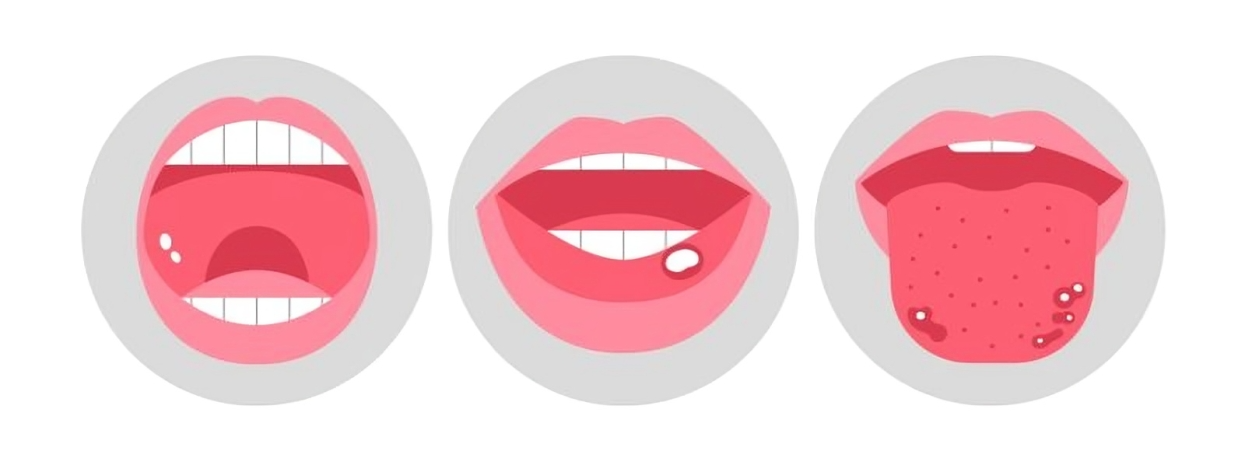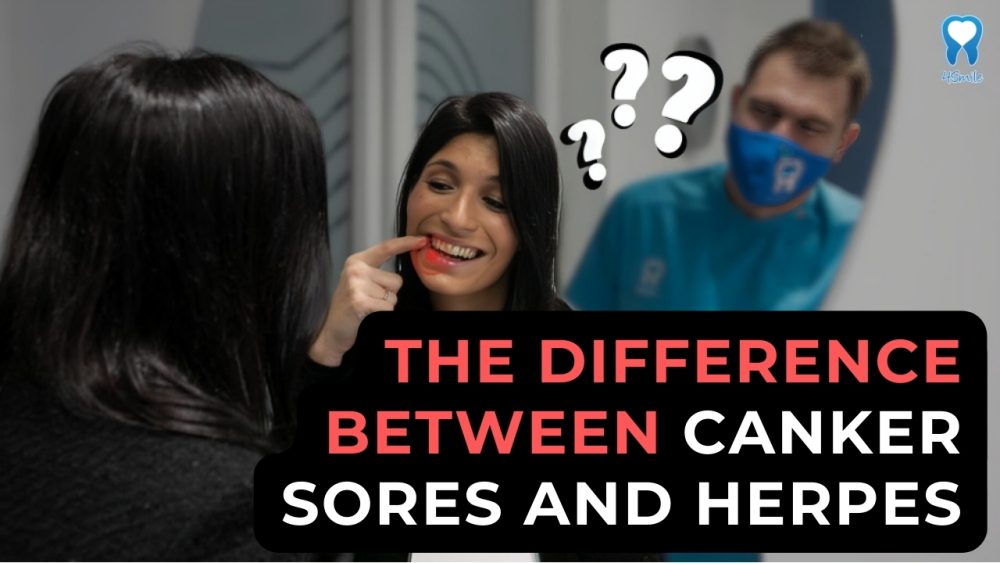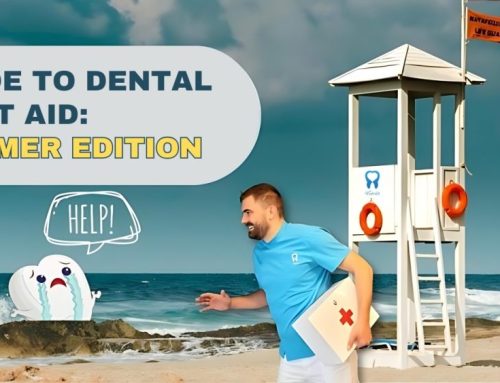Pain, discomfort, and a burning sensation accompanied by sores in the oral cavity or on the lips themselves are symptoms you’ve likely experienced before.
Canker sores and herpes are two common conditions of the oral mucosa that often cause discomfort and pain. Although they may share some similar symptoms, they are different diseases with different causes, treatments, and consequences.
In this week’s blog from Dental Center 4Smile, learn about the differences between canker sores and herpes, how contagious they are, and how to treat them.
WHAT ARE CANKER SORES?
Canker sores are small, shallow, and painful sores that can develop inside the mouth, on the tongue, gums, or inner lips.
These small ulcers are typically white or yellow with a red border and can make eating and speaking difficult.
Equating canker sores and herpes due to similar symptoms, many people think that canker sores are transmissible from person to person.
However, canker sores are not caused by a virus and therefore are not contagious!

WHAT CAUSES CANKER SORES?
The causes of canker sores are still not fully understood, but it has been noticed that certain factors can influence their development:
- Trauma:
Minor injuries in the mouth, like accidentally biting the cheek, can trigger the development of canker sores.
- Stress:
High stress levels can weaken the immune system, creating conditions for canker sores to occur.
- Certain Foods:
Acidic or spicy foods can irritate the mouth’s lining and lead to canker sores in some individuals.
- Genetics:
Some people may have a genetic predisposition to developing canker sores.
Conditions such as anemia, iron and folic acid deficiencies, autoimmune diseases (Crohn’s disease or ulcerative colitis), and immune disorders like HIV in some patients can also lead to the appearance of canker sores.
HOW TO TREAT CANKER SORES?
Canker sores often heal on their own within 1-2 weeks.
However, to alleviate discomfort, over-the-counter topical treatments or medications can help reduce pain and speed up the healing process.
As first aid for canker sores, your dentist Ivan Antolković in Europe recommends:
– Aftamed gel
– Baking soda paste and water
– Parodontax to prevent secondary infections
– Black or green tea for disinfecting canker sores
– Chamomile or sage tea for pain relief and faster healing
WHAT IS ORAL HERPES?
Herpes is a viral infection caused by the herpes simplex virus (HSV).
The herpes simplex virus has two types, and herpes simplex type 1 appears in the head and neck area, most commonly on the lips and oral mucosa.
Oral herpes causes recurrent outbreaks of painful blisters on the lips and sometimes on the tongue.
Since herpes is a virus, it is contagious and can be transmitted from person to person through droplets or direct contact!
Since viruses cannot be destroyed but only brought into a state of hibernation, once herpes enters the human body, it is highly likely to reactivate with a decrease in immunity.
The herpes virus is widespread, as about 80% of adults have antibodies against herpes simplex virus type 1!

WHAT CAUSES HERPES?
- Viral Transmission:
Herpes is highly contagious and can be transmitted through close personal contact, such as kissing or sharing utensils.
- Stress:
Since stress is associated with a decrease in immunity, stress can trigger herpes outbreaks in individuals already infected with the virus.
- Weakened Immune System:
Individuals with weakened immune systems may experience more frequent or severe herpes outbreaks.
HOW TO TREAT HERPES?
Although there is no cure for herpes, antiviral medications such as acyclovir, valacyclovir, and famciclovir can help alleviate and shorten the duration of uncomfortable symptoms.
Good hygiene practices, including avoiding touching the sores, can also prevent the spread of the virus to other areas of the body or to other people.
In addition, for relieving herpes symptoms, your dentist Ivan Antolković from Croatia recommends:
– Herplex cream (acyclovir)
– Liquid anesthetics for mouth rinsing (2% lidocaine or baking soda solution)
*Important! Mouth rinses containing alcohol should not be used!
– Gently rinsing skin changes with water and soap
– Rinsing the mouth with cooled sage tea
HOW TO PREVENT HERPES OUTBREAKS?
Although it is difficult to control the reawakening of the virus in your body, you can strengthen your immunity with propolis, tea tree oil, zinc, and vitamin C. Additionally, consuming foods rich in the amino acid lysine such as eggs, meat, fish, yogurt, and legumes is recommended.
On the other hand, reduce the consumption of foods containing arginine – nuts, coffee, onions, and citrus fruits.
LET’S CONCLUDE – WHAT IS THE DIFFERENCE BETWEEN CANKER SORES AND HERPES?
- Causes:
– Canker Sores: Canker sores are not caused by viruses; they are usually triggered by minor injuries or stress.
– Herpes: Oral herpes is caused by the herpes simplex virus (HSV-1), which is highly contagious.
- Contagion:
– Canker Sores: Canker sores are not contagious and cannot spread from person to person.
– Herpes: Herpes is highly contagious and can be transmitted through close personal contact.
- Appearance:
– Canker Sores: Canker sores are shallow, white or yellow with a red border, and usually occur inside the mouth.
– Herpes: Herpes blisters are fluid-filled with visible redness at the base and often appear on or around the lips.
- Recurrence:
– Canker Sores: Although canker sores may recur in some individuals, they are not chronic and do not have frequent outbreaks.
– Herpes: Oral herpes is a chronic condition characterized by recurrent outbreaks of sores.
- Treatment:
– Canker Sores: Canker sores can be treated with topical medications or mouth rinses to alleviate pain and speed up healing.
– Herpes: Antiviral medications can help manage herpes outbreaks, but there is no cure.
Understanding the differences between canker sores and herpes is crucial for proper diagnosis and treatment, or symptom relief.
Although both conditions cause uncomfortable symptoms, canker sores are generally harmless and non-contagious, while herpes is a viral infection that requires careful treatment to prevent spread and alleviate symptoms.






